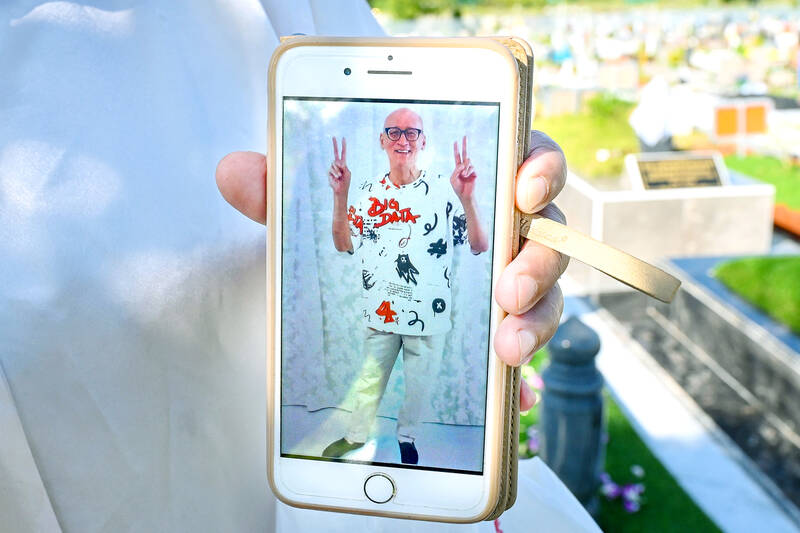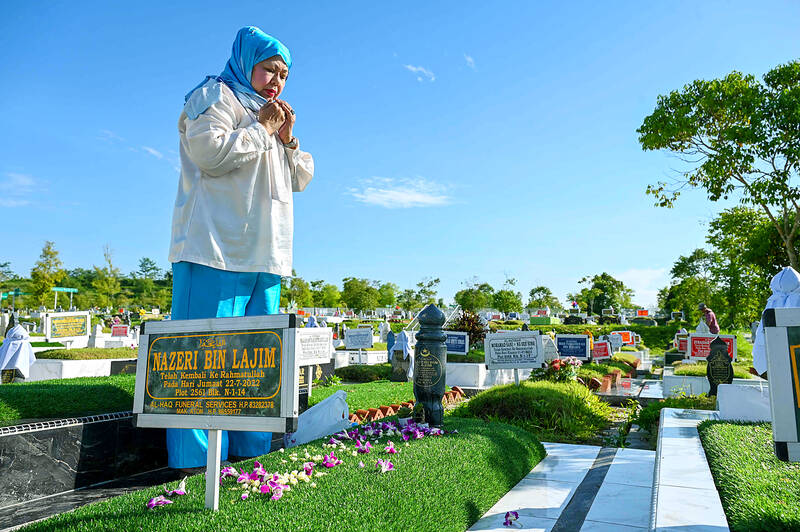Death row inmate Nazeri Lajim beams at the camera, fingers raised in a “V” sign, wearing a shirt emblazoned with large motifs and showing no signs of his impending hanging. Taken days before his execution at Singapore’s Changi prison, the picture is among the last mementoes Lajim’s family has of the 64-year-old, who was executed on charges of drug trafficking.
In the city-state, prison officials offer a photo shoot shortly before an inmate’s hanging, providing simple props like chairs and other items.
“When I see his photograph he’s (a) very healthy man, he’s very good looking man... his face shines,” sais Nazira Lajim Hertslet, his sister. “I was very upset... that he was taken away just like that.”

Photo: AFP
Singapore imposes the death penalty for a litany of crimes, including murder and some forms of kidnapping.
It also has some of the world’s toughest anti-drug laws: trafficking more than 500 grams of cannabis can result in the death penalty.
Thirteen people have been hanged since the government resumed executions following a two-year hiatus in place during the COVID-19 pandemic.

Photo: AFP
In a program first introduced in the 1990s, they were offered the option to pose for photographs before their death.
‘QUITE CRUEL’
Usually taken against a pale-green flowery backdrop, the photos offer a glimpse into the last days of the condemned.
The Singapore Prison Service says participation in the program is voluntary, and that the photo shoots “allow family members to have recent photographs of their loved one.”
Relatives, however, say they have mixed feelings about the practice.
“Actually it’s quite cruel to do such thing, to take photograph on his last days,” said Hertslet, pointing to the horror inmates might feel knowing it was their last time being photographed alive.
“But at least we have his last photo for memories when he’s really gone,” she added.
Nazeri was hanged last year for trafficking more than 33 grams of heroin.
In his sister’s favorite photograph of him, he is wearing a white Muslim prayer robe, his hands clasped in front, looking at the camera.
‘VENEER OF THOUGHTFULNESS’
Little information is publicly available about Singapore’s death row inmates.
The Transformative Justice Collective, which provides support to families of death row prisoners and advocates for the abolition of the death penalty, estimates about 53 people are on death row, the majority convicted of drug offenses. Authorities generally notify inmates and their families about a week before an execution.
During that time, the inmate is allowed to have daily visitors, but they are separated by a glass pane and no physical contact is allowed, according to the TJC.
Spiritual counselors are also provided.
Kokila Annamalai, a TJC activist, said the photo shoots are an attempt “to lend a veneer of thoughtfulness” to the executions.
In the photo sessions, prisoners can strike a particular pose or wear clothing that means something to a family member, she said.
“And so, I think that the photos are also like love letters to them.”
‘EVERY NIGHT I CRY’
Rights groups, including Amnesty International, have long called on Singapore to abolish capital punishment, but the government insists it is an effective deterrent against crime. Tangaraju Suppiah, a 46-year-old Singaporean, was hanged in April for conspiring to smuggle one kilogram of cannabis.
“Every night I cry and every night I think about him,” said his sister Leelavathy Suppiah.
Tangaraju initially refused to do the photo shoot, but relented after his family persuaded him, she said.
Leelavathy has framed a photograph of him smiling, holding his thumb and forefinger in a heart shape — a pose popularized by K-pop stars.
“I’m very happy when I see the photos. At least he’s there in the photos,” she said, speaking in English. “This is the photo our family members everybody like because he smile,” she added.
Still, she wondered what must have been going through her brother’s mind in his final days.“They know they’re going to die,” she said. “It’s cruel, you know?”
WHITE SNEAKERS
Kalwant Singh’s family bought him a pair of white sneakers, which he wore with a T-shirt, sweatpants and a broad smile in one photograph.
Sonia Tarlochan Kaur, the 31-year-old Malaysian’s sister, said he only got about half an hour during the photo shoot to wear the shoes, and so ran around the cell block to make the most of them.
After Kalwant’s execution for heroin trafficking last year, Sonia said she cannot bring herself to look at the photographs.
“They could have just given me that half an hour to hug him tight.”

Growing up in a rural, religious community in western Canada, Kyle McCarthy loved hockey, but once he came out at 19, he quit, convinced being openly gay and an active player was untenable. So the 32-year-old says he is “very surprised” by the runaway success of Heated Rivalry, a Canadian-made series about the romance between two closeted gay players in a sport that has historically made gay men feel unwelcome. Ben Baby, the 43-year-old commissioner of the Toronto Gay Hockey Association (TGHA), calls the success of the show — which has catapulted its young lead actors to stardom -- “shocking,” and says

The 2018 nine-in-one local elections were a wild ride that no one saw coming. Entering that year, the Chinese Nationalist Party (KMT) was demoralized and in disarray — and fearing an existential crisis. By the end of the year, the party was riding high and swept most of the country in a landslide, including toppling the Democratic Progressive Party (DPP) in their Kaohsiung stronghold. Could something like that happen again on the DPP side in this year’s nine-in-one elections? The short answer is not exactly; the conditions were very specific. However, it does illustrate how swiftly every assumption early in an

Inside an ordinary-looking townhouse on a narrow road in central Kaohsiung, Tsai A-li (蔡阿李) raised her three children alone for 15 years. As far as the children knew, their father was away working in the US. They were kept in the dark for as long as possible by their mother, for the truth was perhaps too sad and unjust for their young minds to bear. The family home of White Terror victim Ko Chi-hua (柯旗化) is now open to the public. Admission is free and it is just a short walk from the Kaohsiung train station. Walk two blocks south along Jhongshan

Francis William White, an Englishman who late in the 1860s served as Commissioner of the Imperial Customs Service in Tainan, published the tale of a jaunt he took one winter in 1868: A visit to the interior of south Formosa (1870). White’s journey took him into the mountains, where he mused on the difficult terrain and the ease with which his little group could be ambushed in the crags and dense vegetation. At one point he stays at the house of a local near a stream on the border of indigenous territory: “Their matchlocks, which were kept in excellent order,